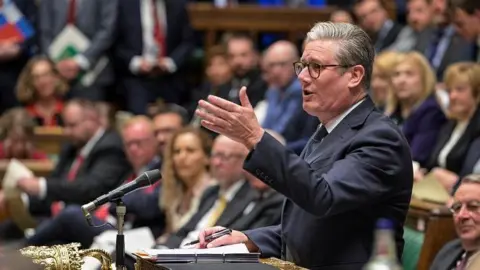**Starmer Faces Growing Rebellion Over Welfare Cuts**
Prime Minister Sir Keir Starmer is currently facing substantial pushback from within his own Labour Party regarding planned welfare cuts. This internal dissent comes in light of proposed reductions that some members of Parliament (MPs) have warned are “impossible to support” unless there is a significant “change of direction.” Recently, 42 Labour MPs authored a letter addressed to **The Guardian**, expressing their grave concerns about projected welfare savings anticipated to total £5 billion recurrently by 2030. They assert that these cuts have instigated considerable anxiety and distress among disabled individuals and their families.
The MPs in their correspondence urged governmental officials to postpone any decisions about these changes until comprehensive assessments regarding the likely impacts on employment and health are conducted and made publicly available. The government has yet to provide a response to these concerns.
This letter’s timing is significant as it precedes an expected vote among MPs on new legislation aimed at implementing these benefits cuts next month. In a debate held on Wednesday, nine Labour MPs articulated their intentions to vote against amendments affecting a crucial disability allowance known as **Personal Independence Payment (PIP)**, as well as changes to **Universal Credit (UC)**. Dissent within Labour ranks has reportedly intensified following the party’s recent electoral setbacks during local elections.
The letter authored by the 42 MPs indicates that the planned cuts signify one of the most extensive attacks on the welfare state since the tenure of George Osborne, who was instrumental in engineering austerity measures over a decade ago, impacting over three million of the nation’s most impoverished and vulnerable citizens. In response to the government’s identification of issues within the benefits system and limited job opportunities for employable individuals, the MPs accuse the government of proposing the wrong solutions. They contend that cuts will not generate jobs; rather, they will exacerbate poverty and suffering.
Further elaborating on their points, the letter acknowledged the necessity to reform the benefits system itself to effectively address the various barriers disabled individuals encounter while pursuing and maintaining employment. The overwhelming sentiment expressed is that unless there is a notable shift in the government’s approach, the MPs will find it unfeasible to endorse the proposed green paper reforms.
In March, the government unveiled a green paper detailing the anticipated revamp of the benefits system. Current expenditures related to health and disability benefits amount to £65 billion annually, projected to rise to £100 billion by 2029. The government estimates that approximately 3.2 million families may experience financial hardship due to the impending reforms, while 3.8 million families are anticipated to benefit by 2030. Additionally, MPs are required to vote on these plans since primary legislation is necessary to alter welfare payments.
This legislation is set to be introduced this month and is expected to navigate through Parliament in June. The **BBC** has reported that some MPs who endorsed the recent letter are also contemplating a direct appeal to the Prime Minister, advocating for a delay in the vote until the complete impact assessment on health and employment outcomes is made public.
In conjunction with the proposed welfare cuts, the government is also introducing initiatives designed to encourage a greater number of individuals receiving benefits to seek employment. However, the **Office for Budget Responsibility (OBR)** expressed uncertainty regarding the efficacy of these employment measures during their evaluation of the green paper, given the absence of detailed information from the government. Instead, they plan to include an analysis of this aspect of the welfare reforms in their forthcoming autumn forecast.
Disability Minister Sir Stephen Timms staunchly defended the government’s proposals, labeling the current trajectory of welfare spending as unsustainable. He articulated concerns regarding poor employment results, high economic inactivity rates, and elevated taxpayer costs, indicating that the system necessitates reform to facilitate better outcomes for both individuals and the broader economy.
As this issue unfolds and the Labour Party grapples with internal dissent, it remains a salient point of contention that could have substantial implications for the political landscape moving forward.



